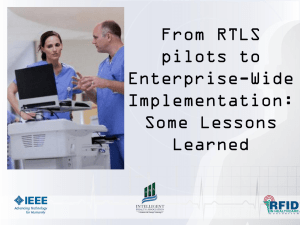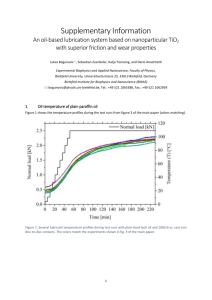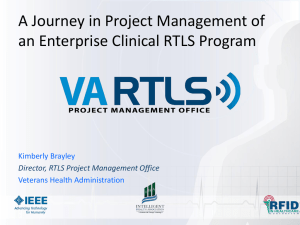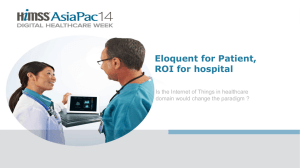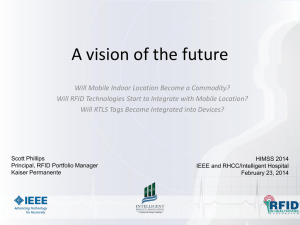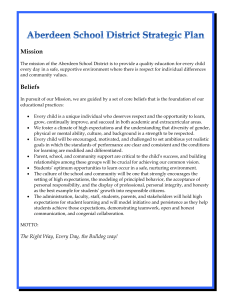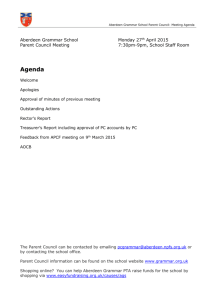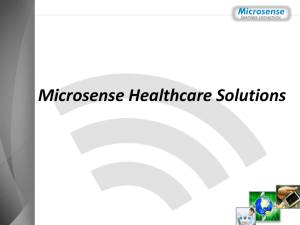QAA Enhancement Themes: Research Teaching
advertisement
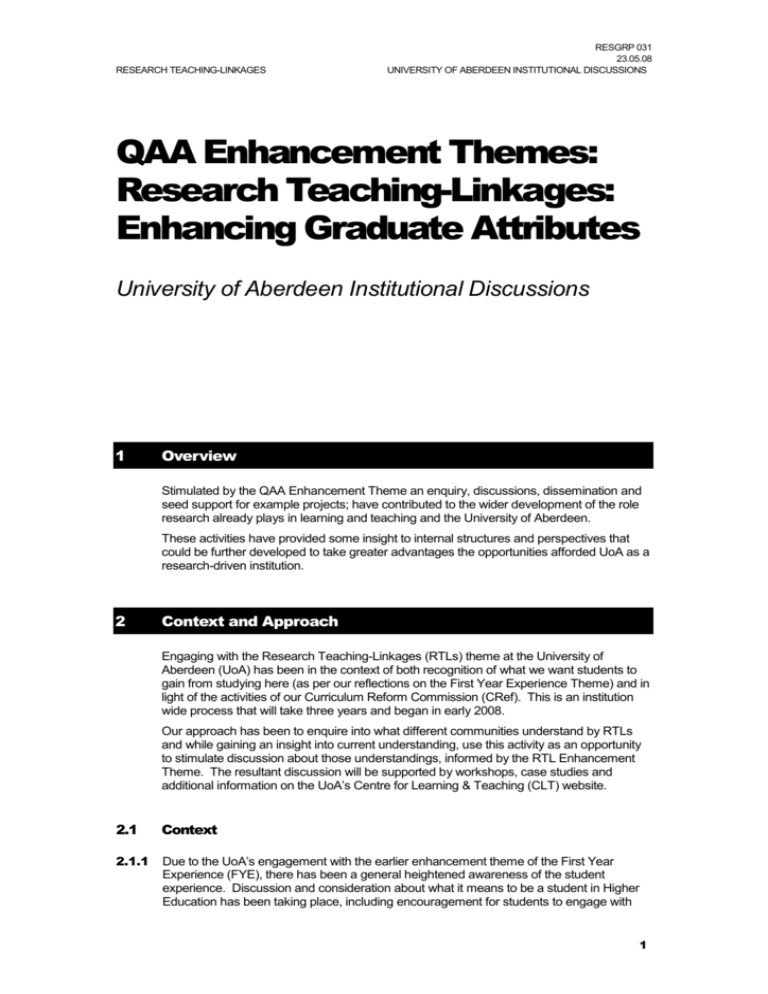
RESEARCH TEACHING-LINKAGES RESGRP 031 23.05.08 UNIVERSITY OF ABERDEEN INSTITUTIONAL DISCUSSIONS QAA Enhancement Themes: Research Teaching-Linkages: Enhancing Graduate Attributes University of Aberdeen Institutional Discussions 1 Overview Stimulated by the QAA Enhancement Theme an enquiry, discussions, dissemination and seed support for example projects; have contributed to the wider development of the role research already plays in learning and teaching and the University of Aberdeen. These activities have provided some insight to internal structures and perspectives that could be further developed to take greater advantages the opportunities afforded UoA as a research-driven institution. 2 Context and Approach Engaging with the Research Teaching-Linkages (RTLs) theme at the University of Aberdeen (UoA) has been in the context of both recognition of what we want students to gain from studying here (as per our reflections on the First Year Experience Theme) and in light of the activities of our Curriculum Reform Commission (CRef). This is an institution wide process that will take three years and began in early 2008. Our approach has been to enquire into what different communities understand by RTLs and while gaining an insight into current understanding, use this activity as an opportunity to stimulate discussion about those understandings, informed by the RTL Enhancement Theme. The resultant discussion will be supported by workshops, case studies and additional information on the UoA’s Centre for Learning & Teaching (CLT) website. 2.1 Context 2.1.1 Due to the UoA’s engagement with the earlier enhancement theme of the First Year Experience (FYE), there has been a general heightened awareness of the student experience. Discussion and consideration about what it means to be a student in Higher Education has been taking place, including encouragement for students to engage with 1 UNIVERSITY OF ABERDEEN INSTITUTIONAL DISCUSSIONS RESEARCH TEACHING-LINKAGES enquiry based learning at an earlier stage in the degree programme. The UoA specifically identified six areas in which it would like to see improvement for first year students1: 2.1.2 A sense of belonging to both their discipline area(s) and the institution as a whole Successful transition to Higher Education Intellectually excitement through engagement with chosen disciplines which motivates them to seek further development Development of generic skills for further study Increasing development of a sense of self responsibility The laying of foundations to becoming reflective, autonomous learners The Curriculum Reform (CRef) project is a review of our educational objectives, programme structures and curriculum content, with a view to developing a high quality and distinctive educational experience for undergraduate and postgraduate students at the University of Aberdeen, which takes account of developing international approaches and is relevant for the 21st century. As part of the CRef process a group has been setup with the specific remit to examine the role of research in the curriculum. Membership of this group includes the QAA Institutional Contacts (ICs) for the RTLs theme and so the group has received many papers and reports as a consequence of the participation of UoA in the RTLs theme helping to show how RTLs can be conceived. This report and further results will also be presented to the group. 2.2 Approach 2.2.1 Communities of interest in RTLs were identified in order to investigate their perspective and understanding of the role of research in teaching. These were: 2.2.2 School Leavers Undergraduates Postgraduates Academic Teaching staff Careers Advisers Employers Graduate Schools The method of enquiry chosen has been through semi-structured interviews and focus groups. Using the questions provided in Land’s Framing Tool2, the Director of Teaching (DoT) for each School3 was invited to participate in an interview and encouraged to bring along up to From “Institutional Discussion of the Nature and Purpose of the First Year: Outcomes of Activities Undertaken” University Of Aberdeen report of 2007 to QAA Enhancement Theme: The First Year Experience 2 Ray Land is Professor of Higher Education and Director of the Centre for Academic Practice and Learning Enhancement at the University of Strathclyde and is a Project Director for the QAA Sector Wide review – The Framing Tool was provided to assist ICs with the process. 3 The University of Aberdeen is structured with three Colleges (Life Sciences and Medicine, Arts & Social Sciences, Physical Sciences), each College contains a number of Schools within which are grouped the Disciplines (e.g. The College of Arts and Social Sciences contains the School of Social Science, which in turn hosts the Discipline of Politics and International Relations). 1 2 RESEARCH TEACHING-LINKAGES RESGRP 031 23.05.08 UNIVERSITY OF ABERDEEN INSTITUTIONAL DISCUSSIONS two colleagues to help bring a broader cross school perspective and represent the academic teaching staff for the disciplines of that School. (See 3.5 below) Postgraduate students were invited to address a question on the role of research in teaching as part of a training exercise they were already doing. (See 3.7 below) A meeting was held between the ICs and the head of the University Careers Service and the CEO of the Association of Graduate Recruiters4 (AGR) was interviewed. (See 3.9 below) School Leavers, Undergraduates and Graduate Schools are yet to be interviewed. The intention is to conduct focus groups with the School Leavers and Undergraduates. The meetings with these groups will investigate their perceptions of an HE curriculum and what role research plays in it. 3 Actions Undertaken Due to the narrative nature in which one activity builds on that of another and the influence that may have on some activities, the following actions undertaken are listed in chronological order. 3.1 IC Attendance at QAA RTLs Meetings and Special Events All IC meetings have been attended except one. The Colloquium on Research TeachingLinkages hosted by Edinburgh University in June 2007 and the Seminar/Workshop run by Professor Mick Healey at Edinburgh University in October 2007 were both attended. 3.2 Visit by Drs Simon Barrie and Claire Carney5 Drs Simon Barrie and Claire Carney (QAA) were guests of UoA in June 2007. Dr Carney explained the RTLs Enhancement Themes purpose and Dr Barrie spoke on Graduate Attributes and RTLs before Vice Principals, Directors of Teaching and Learning, Heads of Graduate Schools and the ICs. 3.3 College of Arts & Social Sciences Learning & Teaching Forum In July 2007 the College of Arts & Social Sciences (CASS) hosted a workshop for staff run by Dr Vicky Gunn (University of Glasgow and Project Lead for the Research TeachingLinkages in Arts and Social Sciences Project) and assisted by ICs. 3.4 Professional Development Workshop for UoA Staff All probationary academic staff attend a mandatory two day ‘Learning & Teaching in Higher Education’ course during their probation period. During the course in September 2007, a discussion session exploring the role of research in teaching was facilitated by staff from the CLT, including IC. 4 AGR represent organisations which recruit and employ graduates, or which offer services in connection with graduate recruitment http://www.agr.org.uk/ 5 Dr Simon Barrie is the Associate Director of the Institute for Teaching and Learning (ITL) and he leads the Institute’s Teaching Quality Assurance activities and the University’s Generic Graduate Attributes Project at the University of Sydney. Dr Claire Carney is Assistant Director of the Quality Assurance Agency for Higher Education. 3 UNIVERSITY OF ABERDEEN INSTITUTIONAL DISCUSSIONS RESEARCH TEACHING-LINKAGES Comments from probationary staff showed that there was a broad mix of understanding of what role research might play in undergraduate learning & teaching. This ranged from “Undergraduates can’t do research, because the research frontier is out of their reach” to “We have everyone from school-leavers, through undergraduates to postdocs working on our projects and if they contribute to a paper they get their name on the paper, why shouldn’t they?”. This reflects the diversity of understanding and thinking in the sector both nationally and internationally6. 3.5 Investigation into Staff Perspectives and Understanding of RTLs DoTs from schools within CASS and the College of Physical Sciences (CoPS) were interviewed over a period of one month at the end of 2007 by IC. The interviews were recorded and the responses in relation to each of the questions in the Framework Tools were encoded for easier analysis. While each of the questions were specifically addressed, the interviews were conducted in a relaxed manner allowing conversation to flow around the question areas to see if a greater insight into the institutional picture could be arrived at. The Framework Tool provides questions in three categories: Institutional Level (see 2.5.1 below); College & School Level (see 2.5.2 below); Course & Curriculum Level (see 2.5.3 below). The encoded results7 of the interviews are available in both tabular (Appendix I) and chart (Appendix II). The following observations are made based on impressions gained during the interviews, supported by the trends illustrated in the charts. 3.5.1 Institutional Level Questions Data Analysis The overriding picture appears to be a lack of awareness and of uncertainty about institutional policies regarding RTLs (Appendix II: Sec 1: Q. 1, 3- 6, 11- 13). However, some specific initiatives were more familiar, namely the Model of the Learner8, the Teaching Awards9, the specific awareness raising initiatives10 and the PG Cert11 (Appendix II: Sec 1: Q. 2, 7 & 8). Comments While this may reflect the role of the Centre for Learning & Teaching (CLT) and the College Directors of Teaching & Learning (DoTLs) in promoting these areas, it may simply be an indication of the more immediate relevance these areas have to everyday teaching activities. In terms of comments over and above those directly related to the Framing Tool questions, the role of the RAE came up repeatedly as something that got in the way of teaching. 3.5.2 College/School Level Questions 6 Need a reference! At the moment figures cannot be taken as representing the whole institute, with insight primarily missing from the College of Life Sciences and Medicine (CLSM). 8 “The model of the Learner sets out what we want for, and what we expect of, our students (both undergraduate and postgraduate), paying particular attention to the opportunities and benefits of learning in a research-led environment.” From The model of the effective learner, a key component of UoA’s Learning & Teaching Framework 2007-2010. 9 Teaching Awards were introduced in AY 2006/07 by CASS & CoPS and have since been adopted for the whole institution. 10 See sections 2.8, 2.10 & 2.11 11 The Postgraduate Certificate in Higher Education Learning & Teaching is run by the Centre for Learning & Teaching and validated by the School of Education. The programme has been offered for the past five years, and is open to staff who are currently teaching at the University of Aberdeen. 7 4 RESEARCH TEACHING-LINKAGES RESGRP 031 23.05.08 UNIVERSITY OF ABERDEEN INSTITUTIONAL DISCUSSIONS Data Analysis The questions were answered with greater certainty. Significant findings were that research into teaching is not widely supported, teaching & learning courses are not generally integrated into doctoral programmes and there are no clear incentives for engaging with RTLs (Appendix II: Sec 2: Q. 6, 8 & 9). It is also clear that there are no mechanisms for the monitoring of RTLs and uncertainty as to whether innovative activities are reported widely within the University (Appendix II: Sec 2: Q. 2 & 3). While it appears from the survey that Personal Development Planning (PDP) is not yet widely adopted, except at PG level (Appendix II: Sec 2: Q. 10), this may change with the recent introduction of the e-Portfolio tool for all UGs. Comments While the results of the survey provide a simple snapshot, the conversations that took place around the questions during the interviews showed a generally positive attitude to the role of research into teaching. While there was not a great desire to specifically carry out such research by academics in disciplines outside of Education and some of the social sciences, there appeared to be a willingness on the part of some, to be the subjects of research. Staff involved in teaching were generally aware of and interested in Higher Education Academy (HEA) publications on teaching practice and where available specific journals on teaching in their own disciplines. Some staff expressed concern that policy didn’t appear to be informed by research (e.g. what is the evidence behind the adoption of ‘best practice’ teaching methodologies or the strategies proposed for addressing retention issues). Conversations around the question on PDP seem to suggest that its value at UG level is not clearly understood, except perhaps for those members of staff whose programmes are professionally accredited or who are involved in PG programmes. Although taken at face value there appears to be no clear incentive or monitoring mechanisms encouraging the use of RTLs, staff generally expressed the view that it is implicit in the nature of teaching at a research-led institute that there are RTLs in place. 3.5.3 Course/Curriculum Level Questions Data Analysis At this level the picture appears to be quite positive. While formal structures of support and quality measures (particularly monitoring (Appendix II: Sec 3: Q. 6)) are not especially evident, there is a general perception that there is quality, support and a clear “through-line” for RTLs in the programmes from levels 1 to 5 (Appendix II: Sec 3: Q. 1, 2, 4 & 5). Comments Despite this, the comments made during the interview provide a mixed view of what RTLs are and the role they can play in a programme, particularly at levels 1 and 2. Issues such as class sizes and the need to provide the students with foundational subject knowledge were often cited as problems when developing RTLs at these early levels. While this is in line with patterns seen across the sector both nationally and internationally12, it illustrates the point that issues about the definition and practical implementation of RTLs still need to be addressed to help overcome these perceived obstacles (See also 2.4 above). 12 Need a reference! 5 UNIVERSITY OF ABERDEEN INSTITUTIONAL DISCUSSIONS 3.6 RESEARCH TEACHING-LINKAGES IC Attendance at Mid-theme Review & Progress Event IC and six other members of staff from UoA representing all three Colleges, the Registry and the CLT attended the mid-theme review & progress event in Edinburgh in November 2007. 3.7 Postgraduate Workshop The UoA’s generic skills training programme for postgraduate research students (ASPIRE) included a workshop on Teamwork and Presentation Skills, in which the students were asked to make presentations addressing a variety of questions. This was used as an opportunity to find out what these postgraduates (PGRs) considered to be the most important aspects of learning and teaching in a research-active institute. While the prime purpose of the exercise was developing teamwork skills, the exercise was used as an opportunity to find out the PGRs’ perspectives for the RTLs survey by asking the secondary question: “You have been given a teaching role with level 1 students. You intend to give them the best learning experience ever! As a researcher, what special “extra” can you bring to this teaching role, to make the learning experience better for these first years?” While the PGRs were able to provide a list of the kinds of activities they felt the undergraduate (UG) students would benefit from (presumably based on their own experiences), such as mini-projects (as specifically opposed to ‘just labs’) and also mentioned their ability to empathise with the UGs situation, they did not suggest anything in their presentations that was distinctive as being delivered by someone active in research. However, when there was a discussion with all the teams at the end of the presentations, there was broad agreement that one important thing that they had learnt from research was that they felt they were much better able to spot where things could go wrong (e.g. during research design) and deal with things when they did go wrong, such as diagnose what happened and come up with solutions. In general they felt their experience meant they were able to handle failure and guide UGs through that process. Their perception is that failure of experimental design, failure of equipment, and failure of reliability of data (for example) are all aspects of research activity that one has to learn to manage, but that this is not necessarily as much of a bad thing as UGs perceive it to be. In fact the PGRs considered these kinds of failures to be authentic research experiences and the process of moving beyond them as an important experience that UGs should learn and with which they can help. 3.8 Learning & Teaching Enhancement Programme The UoA’s Learning & Teaching Enhancement Programme (LTEP) was created to encourage the introduction of new enhancement activities into teaching, and to disseminate good practice throughout the institution, by the provision of small grants, which are available on a competitive basis. The LTEP is run by the CLT and was first introduced to strengthen the First Year Experience Enhancement Theme in early 2007. As part of the RTLs Enhancement Theme activities a further call was made in early 2008. Members of staff were invited to consider ways in which they might enhance the role of research in teaching in any aspect of the undergraduate experience of our students. The 14 applications submitted demonstrated there is a diverse range of imaginative thinking coming from staff on how they can enhance the role of research in learning & teaching. 6 RESEARCH TEACHING-LINKAGES RESGRP 031 23.05.08 UNIVERSITY OF ABERDEEN INSTITUTIONAL DISCUSSIONS Four projects have been selected for funding13; Temporary Ordination in Second Life: Divinity and Religious Studies: School of Divinity, History and Philosophy The proposal is to build up a simple ‘virtual monastery’14, loosely modelled on a small Soto Zen monastery, with appropriate clothing and avatars so that students in the Encountering Buddhism course can experience the challenges and responsibilities of being members of a religious order dependent on patrons for food, clothing and so forth. The outcome will be a research-informed teaching environment for 2nd and 4th year students that uses role-playing to convey the ritualisation, ethical constraints, internal cohesion and social separateness of Buddhist monastic life. This will allow them to understand the ritualisation of everyday life that is a part of monastic behaviour, experience the challenges and constraints of being dependent, as a mendicant community, on the charity of the surrounding community and understand the distinction between the ethics of personal commitment, as taught in popular books on Buddhism or in RME discussions, and the ethics of a vow of behaviour. Use of portable citation tool for study and knowledge acquisition: Geography & Environment: School of GeoSciences The citation tool Zotero15 will be provided on a memory stick to each student in a level 3 class. The students will be tutored and encouraged to use it as a means of collecting, annotating and cataloguing literature and other resources online, for their assignments. The tool (which closely integrates with the Firefox web-browser and MS Word) makes it very easy for them to bring together related material, organise their thoughts, then quote and cite sources correctly. Use of interactive maps for student-led research: Geography & Environment: School of GeoSciences This initiative will enable students to access location-specific research materials. They will be provided with the tools to engage with unfamiliar contexts in a variety of ways, using text, sounds, images and video to record and display primary data. This exercise will facilitate “hands-on” student engagement with ‘real-world’ urban spaces, and will allow students to manage the experience of this engagement. The students will be able not only to develop techniques for generating material through research encounters in the field, but also to manage the interface between field and class. The exercise will provide a link between teaching students methodologies, facts and intellectual traditions about “real world” spaces in Russia and allowing students to be both rigorous and innovative in developing their own accounts of attending to everyday urban life. Student-led Literature and Science Exhibition at Marischal Museum16: English, School of Language & Literature The exhibition project is a natural extension of the process of exposure to different kinds of source material relating the science and literature of the Nineteenth Century, which the students have already had during the course. The students will gain further awareness of how knowledge can be transmitted through the visual presentation of objects, print materials, pictures and text. They will be involved in selecting and 13 Available support was limited to four projects. The monastery will be developed using the online virtual world Second Life http://www.secondlife.com 15 Zotero is an easy-to-use yet powerful research tool that helps you gather, organize, and analyze sources (citations, full texts, web pages, images, and other objects), and lets you share the results of your research in a variety of ways. http://www.zotero.org/ 16 Marischal Museum is one of UoA’s seven museums, is used for research and teaching, is open to the public and specialises most notably in Egyptian and Classical antiquities, non-Western ethnography, Scottish prehistory and numismatics. Its collection ranks alongside the largest in Scotland. 14 7 UNIVERSITY OF ABERDEEN INSTITUTIONAL DISCUSSIONS RESEARCH TEACHING-LINKAGES researching objects and writing appropriate text to accompany these in the exhibition. They will also learn skills of visual presentation, organisation and administration. 3.9 Attendance at Employers’ Forum & Interview with CEO of AGR The UoA Careers Service hosted a seminar in December 2007 for a variety of local employers where the Keynote Speaker was Carl Gilliard, CEO of AGR. IC attended this session in order to gain insight of the employer perspective and was able to take the opportunity to interview Carl. While AGR only represent a subsection of employers Carl provided some useful insights. The following is a distillation of a 45 minute open ended interview. Employers don’t think in terms of graduate attributes, they think in terms of competencies. Competency implies experience in the application of skills and attributes to problem solving. Two important correlates of competency are PDP and project management. PDP is a useful tool for understanding competencies thus managing and accommodating change in a job market where the only guaranteed thing is change. Project management is a skill that can be used for every aspect of life where everything we do in life can be seen as a project. With competency in handling change and managing projects comes efficacy, which is highly valued by employers. Related to this, and of particular note in view of item 3.7 (above) was the observation that the first time many undergraduates fail anything is when they get turned down for a job. Regular failure and making mistakes are guaranteed, especially in the world of constant change. Graduates need to know how to deal with failure, making mistakes and how to recover from that. 3.10 College of Physical Sciences RTLs Workshop In December 2007 CoPS held a half day workshop/seminar to explore RTLs and consider the activities taking place in the College. The workshop comprised two presentations with breakout sessions. The first presentation, by a member of staff from the Department of Public Health17 who is involved in pedagogic research and is interested in the research-teaching nexus, introduced staff to some of the many roles that research can play in learning & teaching. The second presentation was by a new member of staff involved in setting up a new programme in Archaeology and illustrated how students at all levels can be given the opportunity to learn about the subject in discovery mode while ‘learning by doing’. The presentations were followed by a ‘show ‘n’ tell’ of the research-teaching activities from all disciplines of the College. Examples included Physics students building television sets from scratch, Engineering students discovering how their lecturers’ research goes to inform the professional practice of the bodies that accredit their courses and Computing Science’s new Grand Challenges of Artificial Intelligence, which is a research-led Level 1 course. A follow up workshop is currently being planned to look at Enquiry Based Learning (EBL), facilitated by the CLT and the HEA Engineering Subject Centre. 3.11 College of Arts & Social Sciences RTLs Workshop In January 2008 CASS held a half day workshop/seminar to explore RTLs and consider the activities taking place in the College. The workshop comprised presentations and breakout sessions looking at how the research-teaching nexus goes beyond research-led teaching. The first presentation was 17 8 Part of the College of Life Sciences and Medicine. RESEARCH TEACHING-LINKAGES RESGRP 031 23.05.08 UNIVERSITY OF ABERDEEN INSTITUTIONAL DISCUSSIONS essentially the same as that in 3.10 above. The second presentation was by the Director of Teaching & Learning (DoTL) for the College of Life Sciences and Medicine (CLSM) on their new level 2 course ‘Research Skills for Life Sciences’, which has been developed with an active student-driven approach to learning based on curiosity and exploration of knowledge and uses an assessment strategy informed by research practice (i.e. paper/essay, presentation, peer review and viva style questioning). While the audience were from CASS and the course presented was from CLSM it was felt there are many features of the course that would be applicable to any discipline. This was followed by a ‘show ‘n’ tell’ of the research-teaching activities in a selection of disciplines from the College. An example of how, through teaching, an academic discovered a field of research that had not yet been explored and which is now their primary domain was described. Cross disciplinary (including across Colleges) undergraduate fieldwork was illustrated. Another academic described the work he was doing to get undergraduate students in contact with primary sources to use in their assignments. 3.12 IC attendance at QAA Annual Conference IC and six other members of staff from UoA (primarily from Registry and the CLT) attended the QAA Annual Conference in Edinburgh in March 2008. 4 Actions Outstanding 4.1 Enquiry into school leaver perspectives It is hoped that the IC, as a member of the Parent Council of a local Secondary School, will be able to arrange an opportunity to speak to S5 and S6 students as well as their school careers adviser. 4.2 Enquiry into student perspectives Through liaison with Students Association it is intended to hold focus groups with students’ representatives for each of the Colleges. 4.3 Enquiry into Graduate schools perspectives It is intended that the College Heads of Graduate Schools will be interviewed. 5 Reflections 5.1 Strategy and Frameworks UoA’s Strategic Plan and Learning & Teaching Framework, which refer explicitly to RTLs do not seem to be as widely known as they should by academic staff. While most staff surveyed are aware of a notion of UoA being a ‘research-led’ institute, they are not too sure where that notion comes from in policy terms or quite what it means. In fact the Strategic Plan talks about UoA being ‘research-driven’, which implies something subtly different, perhaps learning being pushed forward by research (in all the senses embodied by RTLs) rather than being pulled by research. Perhaps the expression of being ‘research-driven’ and its context in the Strategic Plan and the Learning & Teaching Framework needs to be discussed more widely in the academic community at UoA, so that there is a greater shared understanding and greater sense of shared objectives. 9 UNIVERSITY OF ABERDEEN INSTITUTIONAL DISCUSSIONS 5.2 RESEARCH TEACHING-LINKAGES The First Year Experience Enhancement Theme As the outcomes from the RTLs Enhancement Theme accumulate, it is becoming apparent that the gains sought in relation to the First Year Experience (see 1.1.1 above) could in part be addressed by wider adoption of some RTLs. This needs to be explored further as the outcomes and dissemination of the RTLs theme continues. Possibilities could be explored between groups responsible for the FYE, RTLs and PDP to maximise the gains available. For example have new students interviewing some of the academics in their School or College about ‘the career path that brought them to where they are now and how they view research’, then use the new portfolio tool as a means to record their reflections on what it means to be an academic and where they see themselves fitting into that as an undergraduate. 5.3 Understanding the Role Research Plays in Learning & Teaching There is a very broad range of understanding about what role research can play in learning & teaching across all sectors of the institute, from probationary through to senior staff and both across and within disciplines. Some staff seem to see research activities as a quite distinct activity from UG learning & teaching activities (i.e. research is something that only occurs at the knowledge frontier of a discipline and so may just be reported to UGs). There are also some staff who do not explicitly recognise that the activities around research (i.e. project planning, preparing funding applications, dissemination of results, peer review, etc) as part of the research nexus that could form an accessible and valuable part of the UG learning experience. Many activities in which researchers engage are a mirror of good learning activities and practice. The opportunities provided by engaging in research like activities for experience to bring together the students’ attributes and skills, highlight how study at a “Researchdriven” institute could afford students with unique opportunities to develop their attributes and skills into something more concrete, both in terms of employability and life in general. Through out the process of engaging with academic staff about RTLs a consistent pattern of difficulty has revolved around the meaning of research and in turn how it can play a role in teaching. It would seem that an opportunity exists where staff involved in research and all that it entails are very well placed to formulate learning opportunities for undergraduate students that mirror their own professional research activities in many respects, and simultaneously address concerns about the first year experience and ultimate employability of graduates. However, this would depend on a culture shift away from a narrow definition of the meaning of research, at least in the context of learning & teaching. 5.4 Research Informed Practice There appears to be an interest in pedagogic research as a means to enhance and inform teaching practice. While this is something one might expect in a culture where research informs practice within a discipline, it is not always apparent that it extends to teaching and this may reflect a division between research practice and teaching practice. As already mentioned in 3.5.2, staff do have an interest in the pedagogic research published by HEA and their own discipline journals and do seek to understand policy formulation with reference to evidence either from internal work or from the wider literature. 5.5 Tension Between Implicit Practice and Systematic Practice There would appear to be a range of effective and innovative practice going on at UoA, however there is no apparent systematic approach. Innovation for the most part would 10 RESEARCH TEACHING-LINKAGES RESGRP 031 23.05.08 UNIVERSITY OF ABERDEEN INSTITUTIONAL DISCUSSIONS appear to come from visionary staff who have sought to go beyond what is merely necessary. While this is not really surprising and is a reflection of innovative practice in many walks of life, perhaps it is worth exploring what support and resource is necessary to facilitate innovation in learning & teaching more widely, particularly with regard to RTLs. Systematic approaches may imply greater regulation, which may stifle innovation and be resented, especially in a scholarly community. However, frameworks can be useful to help reduce the cognitive burden of ‘reinventing-the-wheel’. As mentioned in 3.5.2 and 3.5.3 (above) there are no monitoring mechanisms apparent and not much in the way of formal structures of support, particularly with regard to RTLs. If RTLs along with the duly recognised, though informal, quality support are valued it would seem worthwhile to formulate some sort of systematic but flexible approach that could help ensure a consistency of approach and quality across all programmes. 5.6 The Notion of Graduate Competencies While the notion of competencies, brought by the employment market, as something gained from the practical application of skills and attributes seems to be a useful perspective to bring to the design of undergraduate programmes, it does bring with it the spectre of yet another framework of boxes to tick that may not be in the spirit of ‘higher’ education. However, it does draw our attention to the importance placed by employers on experience, especially in areas such as communication, teamwork and project management. In this sense and in the context of what RTLs can bring to both UG and PG programmes, it would be useful to consider what experiences students can gain from RTLs. Further, students themselves should be encouraged to reflect on their experiences and the opportunities afforded them while studying at a research-driven institute, and the benefit such reflection would bring to their employability. To a certain extent this is already recognised in the design of the PGR programmes and supported by their use of PDP. There does not appear to be any reason why these activities should be restricted to the PGR programme, if this is the kind of thing graduate employers are seeking, indeed UGs now have access to PDP opportunities with the introduction of the portfolio tool. Practical experience and reflection on it should not be regarded as something that makes PGRs distinct from UGs and should be accepted that RTLs that go beyond research dissemination are appropriate for all levels of UG learning & teaching rather than being reserved for PGs. 6 Future Activities 6.1 Actions Outstanding See section 3 above 6.2 Report to Curriculum Commission This report will be made available to the Curriculum Reform Commission through the Research Group. 6.3 RTLs to play role in PG Cert A proportion of the Postgraduate Certificate in Higher Education Learning & Teaching at UoA will be devoted to RTLs in the second half session of AY 2007/08. 11 UNIVERSITY OF ABERDEEN INSTITUTIONAL DISCUSSIONS 6.4 RESEARCH TEACHING-LINKAGES Outcomes of LTEP projects The outcomes of the LTEP projects will be reported on the CLT website and, where possible, will be disseminated through the publications of the relevant HEA subject centres and any appropriate discipline journals. 7 Conclusion As might be expected at an institute that considers it self to be ‘Research-Driven’, research does play a significant and diverse role in learning & teaching activities. However, the understanding of what role it can play does appear to be quite mixed and there is not broad agreement or understanding on what exactly ‘Research-Teaching Linkages’ are or might be. This is particularly apparent for the role research into teaching can play outside of the School of Education. While in practice there does not seem to be much of a gap between the institution’s policies and strategies to implement them when compared with the activities of staff. It would appear that this is more due to serendipity than any particular familiarity staff have with the policies or strategies. The perceived lack of any systematic monitoring or framework for the use of RTLs in course design and teaching practice may reinforce this position. Clearly there is some scope for wider dissemination and discussion in both these areas. It would also appear that there are many areas of overlap between desired improvements for FYE and the possibilities afforded by an RTL approach. This enhancement theme has been a useful catalyst for discussion about what role research can play in learning & teaching at UoA, as well as for discovering the broad range of research influenced learning & teaching activities that already take place. The discussions and activities should provide a useful insight for further development of the curriculum and learning & teaching practice at UoA. 12
